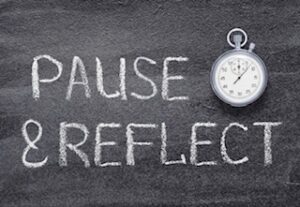
PAUSE and REFLECT
 Two things that come to mind that many of us have challenges with when someone provokes us, are how to pause and to reflect when emotions are bubbling up inside us and we cannot really think straight – if at all. More often than not we react and regret. Something the other person says or does – or doesn’t say or do – sets us off and we spiral downwards. At these times – at some level of our consciousness – we perceive the other person is undermining us, challenging us, questioning us, even threatening us! Something we needed or expected from them is not forthcoming. Something feels unstable within us and around us. Something we trusted – about the other person or ourselves – feels elusive. Something scares us and knocks us off our equilibrium. Many emotions take over – anger, disappointment, hurt, sadness, betrayal, shock, frustration, fear and so on.
Two things that come to mind that many of us have challenges with when someone provokes us, are how to pause and to reflect when emotions are bubbling up inside us and we cannot really think straight – if at all. More often than not we react and regret. Something the other person says or does – or doesn’t say or do – sets us off and we spiral downwards. At these times – at some level of our consciousness – we perceive the other person is undermining us, challenging us, questioning us, even threatening us! Something we needed or expected from them is not forthcoming. Something feels unstable within us and around us. Something we trusted – about the other person or ourselves – feels elusive. Something scares us and knocks us off our equilibrium. Many emotions take over – anger, disappointment, hurt, sadness, betrayal, shock, frustration, fear and so on.
Since we become upset and unsettled when conflicts occur, it is difficult at these times to PAUSE and find a way to get some distance – physical or emotional or otherwise. This also means we are unable to shift to the executive functions of our brains to REFLECT and contemplate the dynamic of what went on. At these times, we are overwhelmed with emotion and unable to think clearly and consider the places we go to in our minds and hearts with any objectivity. This week’s Conflict Mastery Quest(ions) blog invites you to consider an interpersonal dispute that has set you off and provides an opportunity to pause and reflect and see how that supports you as you figure things out.
- What’s happened between you and the other person that set you off?
- What specifically did the person say or do at that time?
- What had you expected from or hoped for that the other person didn’t deliver on?
- What is it about that (your answer to the previous question) you found most distressing?
- How did (do) you interpret the other person’s actions or words i.e. what do you think they intended?
- What did you say or do in reaction that contributed to the negative dynamic that evolved?
- What might they have expected from you or hoped for instead?
- What about your answer the previous question makes sense? What doesn’t make sense to you?
- If you gave the other person the benefit of the doubt (that is, they didn’t intend to offend you) what else occurs to you to describe the negative dynamic that evolved?
- If the other person intended to offend you, in your estimation, how might you proceed in a way that will not give you sleepless nights?
- What else occurs to you as you consider these questions?
- What insights do you have now that you didn’t have before you answered these questions?

